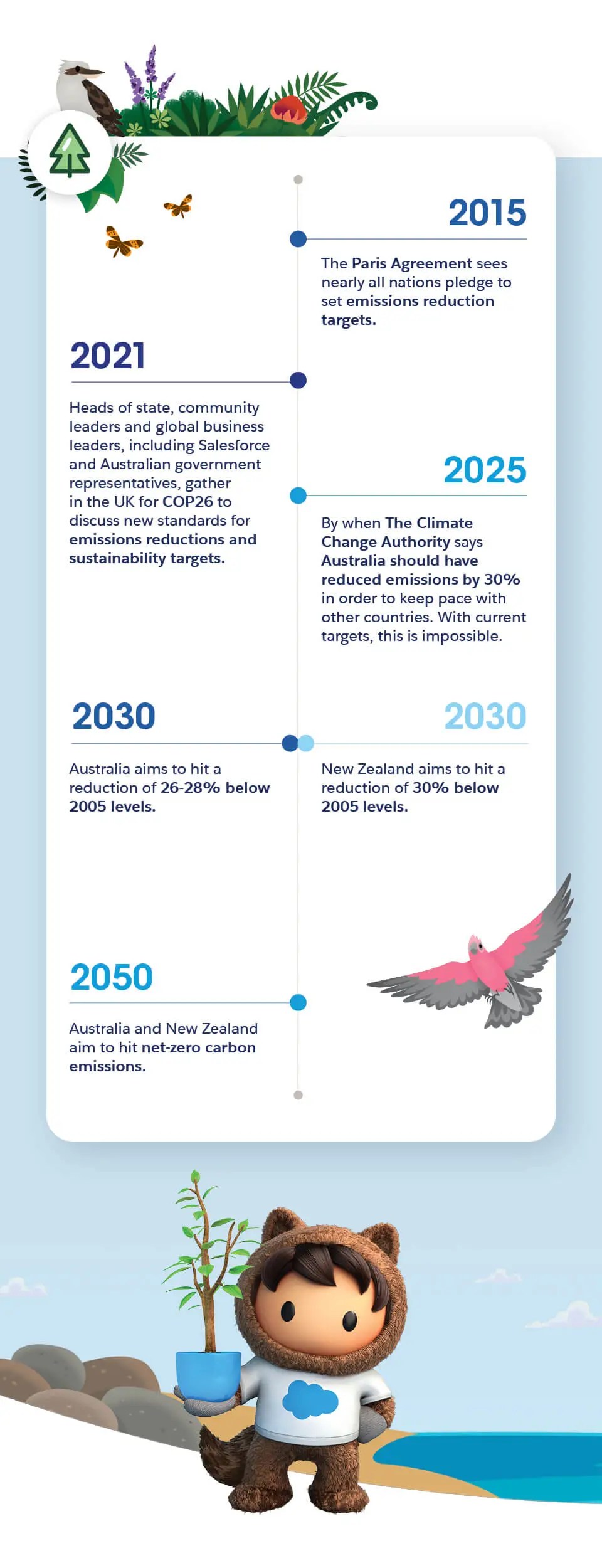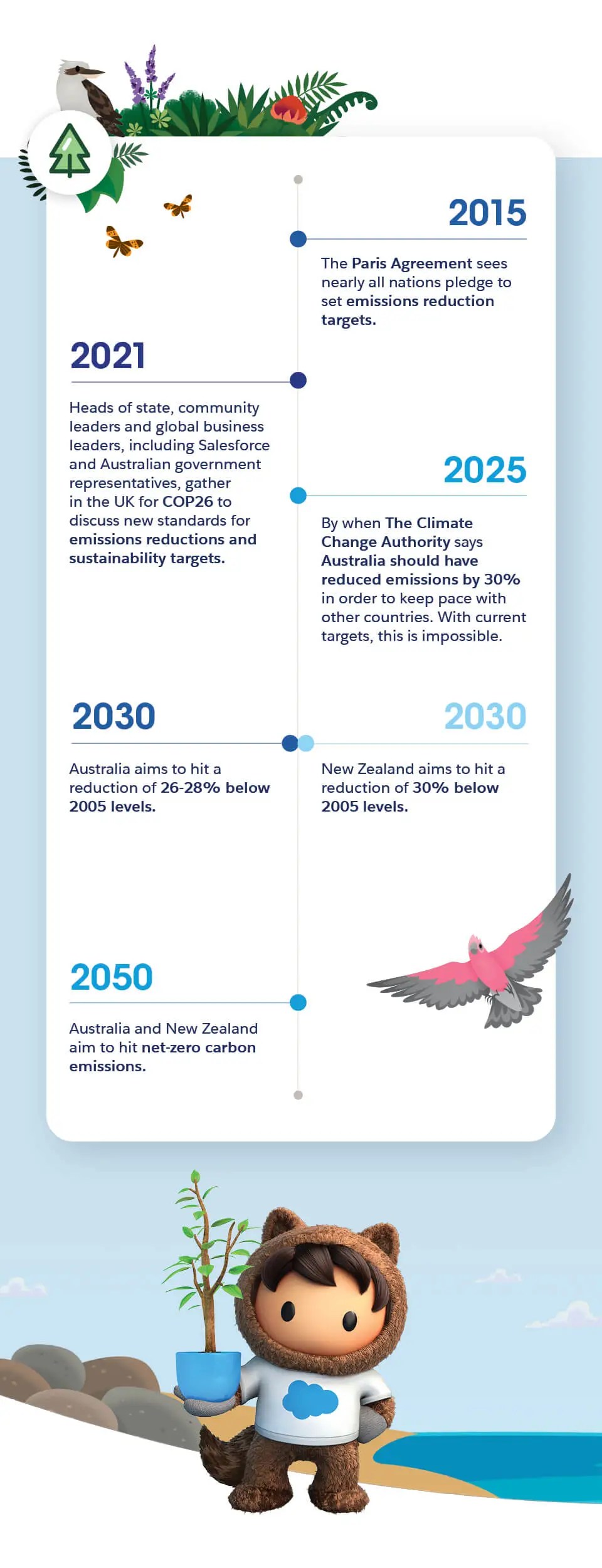Over the past fifteen years or so, sustainability has progressed from a buzzword hovering on the fringes of society to an integral part of the public consciousness. Now, due to concerns over rising sea levels, climbing temperatures, extreme weather events, worsening air pollution, biodiversity losses and the depletion of natural resources — the imperative to take action both on a micro and macro level has intensified. The momentum to make real change is picking up speed, particularly among the business community.
Previously, corporate social responsibility and sustainability intersected for valid, yet sometimes small-scale, initiatives such as composting or litter clean-up days. As awareness about the threats posed by climate change starts to infiltrate every aspect of society, sustainability in business has moved from a supplementary concern to a core imperative.
The business community has an essential role in helping Australia – and the rest of the world — achieve sustainability targets and combat climate change. As employers, makers, providers and community leaders, businesses are uniquely placed to lead by example. In order for businesses to put their considerable powers to good use in service of a better world, sustainability needs to be woven into the very fabric of the organisation.
What does such a weaving look like? Action is ongoing and required at multiple levels, and there isn’t a single answer. While the sustainability journey is specific to each organisation and isn’t always clear-cut, one thing is for sure: businesses can and should be platforms for change — and the time for action is now.
The good news is most are ready to take action. We can’t go back to business as usual. In light of that inspiring reality, here’s our deep dive into the sustainability imperative.
Why 1.5ºC?
Let’s zoom out for a second … to global temperature and the dreaded 1.5ºC
If there was ever a number synonymous with the worsening climate emergency, it’s 1.5, or in other words the temperature threshold, in degrees Celsius, that we don’t want the Earth to get close to exceeding.
The idea is that our planet is currently 1.1ºC hotter than pre-industrial times, and that the only way to avoid the worst ravages of climate change is to keep that figure under 1.5ºC.
A spike of 0.4ºC may not sound like much, but in reality, it means the difference between unnecessary calamity and unavoidable catastrophe.
By the numbers
- Global emissions must drop 7.6% per year from 2020 to 2030 to keep temperatures below 1.5 ºC.
- The Australian climate has warmed on average by 1.44ºC since national records began in 1910.
- Out of 64 countries, Australia ranks 59th on the Climate Change Performance Index in 2022.
- 65% of Australian CEOs listed climate change and environmental damage as a top threat to growth.
- 36% of Australia’s top 150 companies have either achieved or committed to carbon neutrality.
- Approximately 4 out of 5 Australians believe brands should make changes to address social and environmental issues, while 3 out of 5 actively turn to brands that do.
Approximately 60% of Australians will pay more for products with lower environmental impacts.
Know the lingo
We all know about climate change, but what about more recent sustainability-related terminology? We’ve summarised some common terms and their recognised definitions below:
- Net Zero: cutting climate pollution to zero by balancing what you put out into the atmosphere, with what you remove from it.
- Carbon Neutral: achieving (usually in reference to an entity) a balance between the behaviours and practices that produce carbon dioxide and those that limit and remove it.
- Greenwashing: marketing spin wielded to convince consumers that an organisation’s offerings and actions are environmentally friendly, when they aren’t.
- Ecopreneurship: when the ingenuity and insight that an entrepreneur brings to business success is applied to environmental and sustainable advancement.
- Circular economy: a model of production and consumption that fosters the continued life cycle of ‘waste’ through practices such as reusing, repairing, recycling, upcycling, refurbishing and sharing.
Mythbusting: Sustainability in business
“Sustainability is a side pursuit”
True sustainability is only possible when it’s a core tenet of an organisation’s mission and vision.
“Sustainability is too expensive”
While there may be costs up front, sustainable practices such as cutting emissions and creating efficiencies can save money in the long run.
“Consumers don’t care”
Every year, more and more consumers are actively seeking out brands that prioritise sustainability.
“Employees don’t care”
Likewise, jobseekers are more concerned about corporate social responsibility than ever before, and employees are more engaged and productive when they work for an organisation that shares similar values and purpose.
“Corporate social responsibility is an empty gesture”
Cynics and climate deniers attempt to demean what is a flourishing and vital aspect of modern business – one that is enacting very real change.
“Businesses cannot make a difference”
Considering they are some of the world’s largest producers and consumers – the exact opposite is true.
Emission reduction targets over time


Tech and sustainability: A promising tomorrow
If businesses use technology to track sales, why wouldn’t they do the same for their annual greenhouse gas inventory? Innovative technology now allows industries to implement sustainability initiatives in a way that’s never been possible before.
For example, Net Zero Cloud (formerly Sustainability Cloud) allows organisations to go carbon-neutral faster through Customer 360 solutions. Data-driven insights allow users to take meaningful action both on a day-to-day and long-term basis, whether through tracking emissions or finding clear methods of increasing energy efficiency. The platform also facilitates carbon accounting audits in weeks instead of months.
Considering, 78% of people believe that companies are responsible for fighting climate change, then platforms such as Net Zero Cloud are not only welcome, but integral to the future of business.
Salesforce is part of a growing brigade of tech companies that not only operate under a net zero paradigm, but actively create solutions that enable others to achieve the same — all in service of a cleaner, safer and more accountable future.
Watch: Net zero and becoming a platform for change
Net zero is an idea that’s quickly become a focus for businesses around the world. Learn more about what actions you can take, why there’s cause for optimism, and how Salesforce can help your business be a platform for change.
5 questions with a sustainability expert
Meet Salesforce’s Lindsey Peterson, Global President for Earthforce — Salesforce’s equality group and community focused on sustainability
1. How can tech-based companies reduce their environmental footprint?
I think Salesforce’s net zero operations strategy is a good model, which is avoid, reduce and mitigate. We avoid emissions by basing operations on clean energy grids, we reduce through our investment in things like green office spaces, and we mitigate by offsetting our scope 1, 2 and 3 emissions.
In September 2021, Salesforce announced it became a net zero company across its full value chain and has achieved 100% renewable energy for its operations. This milestone was achieved through six sustainability priorities:
- Emissions reduction
- Carbon removal
- Regulation and policy
- Innovation
- Education and mobilisation
- Trillion Trees / ecosystem restoration
Finding a model that similarly brings multiple actions together into one comprehensive strategy is a great way for an organisation to work on reducing their environmental footprint.
2. How do Salesforce employees become involved in sustainability initiatives?
One avenue that is important is through mobilising your employee base. Earthforce is a result of that mobilisation. Our mission is to educate others about environmental sustainability and being better people for the planet. Through employee engagement initiatives, you’re able to put multiple heads together and understand where you need to enact change — not only internally but also out in the community. We have an offset procurement team that looks into both these areas and really scrutinises which projects will make the most difference.
3. The Salesforce ecosystem is made up of many partner organisations. How do you negotiate your own sustainability ethos with theirs?
Sustainability is an established aspect of all supply chain contracts, which is a welcome thing to organisations as it often helps to focus their environmental strategies. What this means is that the entire ecosystem is working to science-based targets in service of the sub-1.5ºC warming threshold.
With the addition of Net Zero Cloud, organisations have the ability to track their targets and both see and build upon the difference they’re making.
4. What would you say to an organisation looking to assemble a ‘green team’?
I think self-organised groups are always the most successful. People want to organise around what they’re passionate about, and with sustainability close to so many people’s hearts, you’ll often find the drive for sustainability within the organisation. Of course, you will almost certainly need to engage or even enlist the services of experts, but the seeds of green teams are usually planted from within.
Over the past financial year, 10,000+ Earthforce members worldwide put in 120,000 hours of meaningful volunteer work, and Salesforce ANZ employees so far have contributed 39,211 volunteer hours towards environmental sustainability. These numbers prove that the desire to do good is out there if you look for it.
5. Over the coming years, what will be the biggest concern when it comes to sustainability in business?
Advocacy. Organisations need to focus not only on their own internal environmental policies, but on advocating for changes in public policy.
Salesforce was an official partner of COP26, the 2021 United Nations Climate Change Conference held from 31 Oct to 13 November in Glasgow, Scotland, UK.
Industry Spotlight – Retail
The popularity of ecommerce has skyrocketed in recent years, and it became a lifeline for many people during pandemic lockdowns. However, global supply chains continue to come under stress, and consumers are starting to put more pressure on retailers to become more sustainable.
Top minds in sustainability and the retail industry recently gathered to explore new thinking required for the circular economy, the role of goods that never got a first life, and tracking and forecasting sustainability commitments via technology. Check out the link below to learn more on this topic from:
- Imran Khan, Industry GTM Director — GPG & Retail, Salesforce APAC.
- Jason Robertson, Director — Policy, Sustainability and Impact, Australian Retail Association.
- Alison Covington, Founder and Managing Director, Good360.
Ready to make a difference?
Are you ready to take the first steps on your sustainability journey? Here are some ways to get started.
Start a conversation with your stakeholders
The only way to determine the right course of action is to hear from those in the thick of it.
Look out for those who care about sustainability
The people in your organisation that will make things happen are those with a passion for positive change. Create an environment where they have the opportunity to come forward.
Consider assembling a ‘green team’
Introduce passionate employees to sustainability experts and enable that newly formed team to work towards a better future for the organisation and the wider community.
Start tracking emissions
Platforms such as Net Zero Cloud allow you to take control of your environmental footprint.
Stay informed
Sustainability is an ever-evolving field and clarity is obtained by keeping abreast of public policy and global climate endeavours.
Technology can play an important role in helping drive climate action. That’s why Salesforce has created Net Zero Cloud to help companies track and reduce their emissions and reach net zero. We believe that businesses can be platforms for change. To learn more about how your business can be part of the sustainability movement, click here.



















